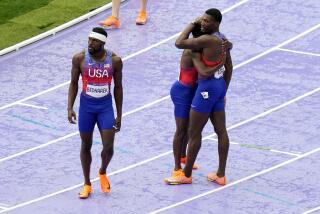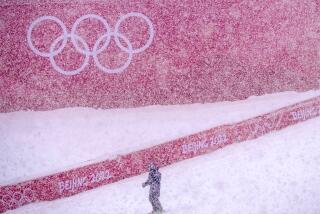Canadian athletes feeling a mountain of pressure
- Share via
Reporting from Whistler, Canada — The day began perfectly -- crowd screaming, cowbells jangling -- as Manuel Osborne-Paradis stood atop the men’s downhill course.
“I got totally into it,” he said. “It was awesome to have the Canadian crowd totally pumped.”
Lunging from the starter’s gate, the Vancouver native rode those cheers to a quick time halfway down, looking every bit the favorite for gold. But then he bobbled and slipped, losing precious tenths of a second.
The race was all but over, Osborne-Paradis reaching the bottom in 17th place.
“The start was better than the finish,” he said.
And that pretty much summarizes the performance of the entire Canadian Olympic team -- at least so far -- in these 2010 Vancouver Games.
A nation that had vowed to “Own the Podium” has produced only one golden moment amid several conspicuous misses, tied for third in the medal count.
National Olympic officials have urged patience, saying they didn’t really expect heavy metal until next week, but there is reason to wonder.
The Games had commenced with such optimism north of the border, much of it springing from tens of millions of dollars raised through the “Own the Podium” program established to ensure Olympic glory.
It was an aggressive effort from a country not exactly known for aggression. As the Canadians sought to boost their odds, they also were accused of giving foreign athletes only limited training time at their Olympic venues.
Last week, the head of the national Olympic committee predicted a medal count in the high 20s and a Vancouver Organizing Committee executive upped the ante.
“The success of the 2010 Winter Games will be largely defined by the achievements of our Canadian athletes,” VANOC Vice President Andrea Shaw said.
Right off the bat, a historical trend needed reversing: No Canadian had won gold on home soil. Not at Montreal in 1976. Not at Calgary in 1988.
The first chance came on Saturday when favorite Jennifer Heil held the lead with one skier remaining in the women’s moguls. But that one skier, Hanna Kearney of the U.S., scorched a run to pull out the victory.
“I was going for gold, it was in my sights,” Heil said. “I left a few cracks in the door, unfortunately.”
Things went worse in the men’s 1,500-meter short-track race, where the heavily favored Charles Hamelin couldn’t even make the final.
Along with disappointment, the Canadian team was taking shots.
U.S. snowboarder Nate Holland suggested it was fine for Canada to own the podium, but he and his teammates planned to rent it during the Olympics.
To which Canadian snowboarder Drew Neilson replied: “That rent will be unaffordable.”
Heightened expectations clearly weighed on some of the team.
“For sure, having the Games at home is more pressure because you don’t want to disappoint your people,” pairs skater Jessica Dube said. “But we just have to focus on what needs to be done.”
The logjam finally burst on Sunday when Alexandre Bilodeau earned both gold in the men’s moguls and a telephone call from Prime Minister Stephen Harper.
“He said he was really proud that the curse was broken,” Bilodeau recalled. “He said it was only the beginning of the adventure for Canada, and that the train would really begin rolling now.”
That same day, Kristina Groves won bronze in the 3,000-meter speedskating competition, a performance that was followed by Mike Robertson’s silver in snowboard cross on Monday.
Still, the hopes of a nation -- if not that hefty medal prediction -- loom large.
“Everyone felt it for sure,” skier Robbie Dixon said after Monday’s downhill. “It’s pretty heavy.”
Maybe that’s why Dixon took a risky line down the hill, clipping an early gate then falling shortly after.
“It’s tough not to be coming across the finish line the right way,” he said.
As Swiss skier Didier Defago stood atop the podium -- he finished ahead of Norway’s Aksel Lund Svindal and Bode Miller of the U.S. -- Osborne-Paradis tried to put the day in context.
Skiing can be as unpredictable as the weather, he said, with varying courses and conditions that might favor one racer over another. A subpar finish did not erase his World Cup success this season.
But he conceded this wasn’t just any race.
“On any given, normal weekend, it would have been ‘Oh, that’s too bad but he’s got next weekend,’ ” Osborne-Paradis said. “Because it’s the Olympics, that was the one chance. That’s too bad.”
david.wharton @latimes.com
twitter.com/ LATimesWharton
More to Read
Go beyond the scoreboard
Get the latest on L.A.'s teams in the daily Sports Report newsletter.
You may occasionally receive promotional content from the Los Angeles Times.







